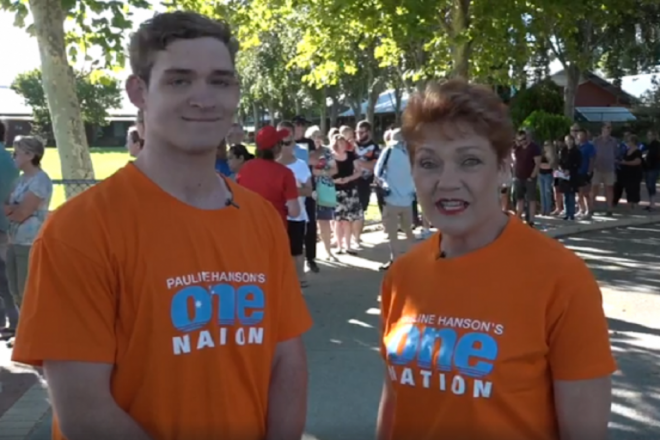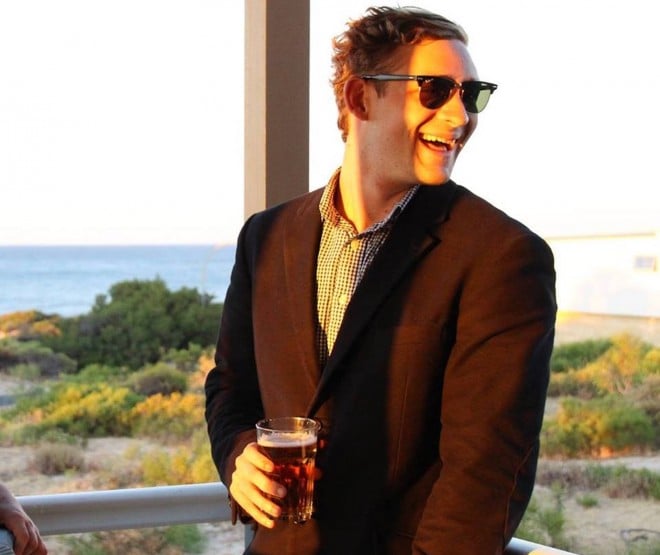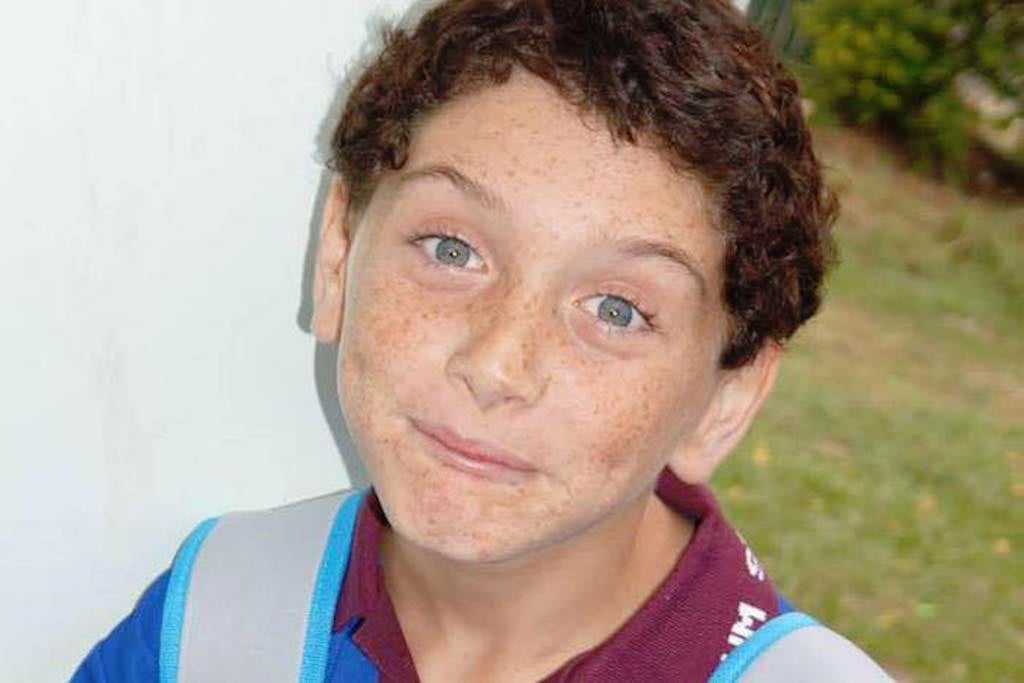Meet The 20-Year-Old Student Who Ran With One Nation In Western Australia
Please explain?

John Zurakowski is 20 years old and just ran for the seat of Baldivis in the West Australian election. He ran with One Nation. He is 20 years old and ran with One Nation. I repeated this mantra several times as I drove to our interview.
I spoke to John two weeks before the state election. It was a bloodbath; the Liberal Barnett government was washed away in a sea of red. One Nation, at one point polling at 13 percent and ‘guaranteed’ the balance of power in the upper house, were denied by West Australian voters. Though their end result — 8 percent — is still concerning, John and his mates were kept out of power. The preference deal between One Nation and the LNP was a disaster for both parties: Hanson’s bout of lunacy about Putin and vaccinations alienated her base while spooking Barnett’s.
Still, even after the state’s rejection of One Nation and its candidates, I can’t stop thinking about John, and what it was that made him run with the party in the first place.

When we met at a Palmyra café, John was cordial but paranoid that I was one of the media’s unhinged lefties, craving the virgin blood of a would-be far-right wunderkind. In reality, I was just curious as to how he ended up here. Why?
“I see this as an opportunity,” he said simply. “I saw One Nation as a party that had a few policies that I’m quite aligned with, obviously. So I thought why not have a go?”
John had no prior history with One Nation. He’s a University of Western Australia chemistry student, previously hailing from private school Christ Church Grammar, but he’s no good ol’ boy. He’s from a working class background — the son of a teacher and a nurse, who works part-time at a pub — and that tension between Western Australia’s old money and their hopeful acolytes seems central to John’s reasoning for getting involved in politics. The seat he was running for, Baldivis, is a traditionally safe Labor seat. John himself described it as “like walking into the middle of Russia… very red.”
To understand John, you first have to grasp the disaffection currently gripping WA. In the public’s eye, the Barnett Government squandered the mining boom. Unemployment is on the rise. No one talks about the state’s future without repeatedly uttering the word “uncertainty”. Crystal meth abuse is perceived as an incurable ever-growing epidemic. Traffic congestion is “driving folk nuts”. Whenever I asked John for a specific policy One Nation will offer to solve these problems, he simply regurgitated the touchstones of “jobs, crime, congestion” like an off-key mantra. In Perth, as it is right now, that mantra could have gone far.
John’s enthusiasm rang true, but statements like these fell in my lap with a decidedly hollow thud. No policy was expounded upon. I heard complaints and statements of opposition, but no solid direction.
“I’m having a tremendous amount of fun.”
“A lot of voters today look at how parties are presented to the media and they won’t look past the headline,” he says. “A lot of the headlines can make One Nation seem quite extreme in the way we go about things.” But John wants to make it clear to me that in Australia ‘extremism’ is a matter of perspective: “I read a thing on [John] Howard; quite interesting what John had to say about the party. He said, at the moment, ‘the only extremist party in politics across Australia is the Greens’. And look who’s playing footsies with them: the ALP.”
John offers One Nation as an alternative to what he perceives as the “social engineering” of the radical Left. I ask what he means exactly by ‘social engineering’. “How would I explain…” he says. “[It’s] a way of changing the motives and ideas of the population — engineering the social side of things. [That] is a difficult thing to impose on people.”
John tells me that programs like Safe Schools are an example of identity politics materialising as “dangerous” policy that could harm Australian children and society. When I ask him about suicide rates amongst LGBTQI people in the rural electorates where One Nation holds the most support, he says programs like Safe Schools don’t promote acceptance and diversity as much as they do encourage people to ‘choose’ LGBTIQ identities.
“People are going to view it in a certain way,” he says. “If you bring it in early, who knows the effect it could have.”
John’s ideology is a murky mix of libertarian self-determinism and bloated culture wars. He suggests that programs like Safe Schools and their focus on “self acceptance” are indicative of the solipsistic selfishness of the radical Left — an imposition where there needn’t be any. He does, however, advocate for some much larger impositions.
“When you’re associated with One Nation, the first policies people want to hear are your stances on immigration and Islam, and that’s fair enough, because we do have policies that are in place relating to those areas,” John said. For the record: those extreme policies include an investigation into Halal food, a ‘burqa ban’, and a proposed halting of Muslim immigration. When asked about the infamous investigation into Halal foods, John told me “the whole halal thing, the policy associated with it, is when you have money like that being taken away from your consumer, I think people should be entitled of seeing exactly where the money goes.” He didn’t tell me where he thinks it goes.
When I asked whether Islam and Islamic immigration was much of an issue with constituents in Baldivis, he said that “they generally do [care]”. “Look at this whole geopolitics thing in the shoes of a child who is growing up in Syria who has seen maybe half his family killed. This is obviously a very bad situation for a child to be in, but you can imagine if you’ve seen war or if you’ve seen killings or these terrible acts being done around him… Imagine that person being taken out of that environment and being out somewhere else and imagine the mental sort of issues that could potentially develop. I think there should be things in place that help these people and don’t allow them to form extremist or radical ideas.”
I asked John what he thought of the policies already in place designed to do just that, and he told me that One Nation’s policies were more to do with “defending us from radical Islamic extremism”. “The way I see it at the moment is, yeah, I do have my stances and opinions and point of views on those policies, but it’s sort of hard to focus on those when unemployment in the state is quite high…”
John doesn’t offer much else regarding these policies. I get the impression he’s slightly uneasy; he at least seems to know people expect him to be embarrassed by them. The consistent thread running through our conversation was John’s wariness about how One Nation is perceived. He consciously toned down the rhetoric wildly employed by Pauline Hanson — a soft rebranding, like a box office flop with its title altered for the DVD budget bin.
I shudder to characterise him as a child, but at 20, it’s hard to see past the cherubic smirk and cartoonish certainty — like a boy from the realm of 9Gag, willingly carousing with Australia’s most frightening politicians. He also seemed very aware of that impression.

John isn’t an intractable bigot. His confused views reflect a bigotry of youthful ignorance, not entrenched malice. I got the sense he’s quite disconnected from his party’s history — genuinely unfamiliar with the violence of One Nation’s rhetoric at its ‘90s peak. It makes his association with them all the more disheartening and worrisome.
When talking about the nature of One Nation’s ideological hysteria, Johns says, “that’s why we attract attention”. “I’m having a tremendous amount of fun with it,” he said. He describes the election as “the ultimate game of chess”.
John did the legwork: doorknocking, meetings, phone calls. He was in regular contact with the party office, but told me there’s “a lot of freedom to go out and run your own campaign.” That is the unique opportunity offered by a party as haphazardly managed as One Nation. Though there’s high risk — politically and socially — in attaching yourself to One Nation at such a young age, it’s this freedom that appealed so much to roguish candidates.
It’s difficult to imagine the social navigation required by a student who is also running with Australia’s most notorious political party, but John’s openness with his politics surprised me. He said there is vocal support for One Nation and “similar groups” at UWA.
It’s important to note that UWA is a significant recruiting ground for state Labor and the LNP — many of its student politicians live in a hyperbolic state of self-branding and self-importance, it has the monopoly on student cum politician output in the state. A majority of UWA’s students are wealthy private school alumni from Perth’s ‘Golden Triangle’. The university’s student body and political careerists tends to be a-typical Tories. Yet even on a campus as traditionally conservative as UWA, John stands out. He doesn’t fit the mould of the law/pol-sci careerist two handshakes away from managing a thinktank for daddy’s firm. John is something new, born of disillusionment and impatience — a reaction against the atavistic arcs of Tories like Colin Barnett and Malcolm Turnbull. He’s the son of a state where youth unemployment is 26 percent.
Despite his support, John told me he hoped to be “a moderate voice within the party”. He hopes to represent the new generation of One Nation followers. He points out that he’s “not Rod Culleton”, who he agrees is an “extreme voice”. He repeatedly assured me that this is not the party that collapsed like a race-baiting Jenga tower in 2001.
When I think of that party, however, I think of one person: Pauline Hanson. I asked John: has she changed? What’s different?
“The one thing about Pauline Hanson is she hasn’t changed in 20-odd years,” he said. “She still has that same resilience to keep on pushing forward no matter what people have said to her or said about her or how people have attacked her. She hasn’t changed her point of view or opinions…”
“So what’s changed since 2001?” I asked. “Her policies?”
“Ummm…” He took a long pause. “I would have to look into what the policies they put forward in 2001 were… I didn’t look at that. What I did look at was the age of candidates, the issues that they had, those kinda things, and why we want to move away from things like that.”
Four days later, the Pauline that John was too young to recall would rear her head, appearing on national television to praise Vladimir Putin and out herself as a anti-vax truther. Her appearance at the Paddington Ale House in Perth that Thursday was met with heavy online trolling and onsite protests.
In the end, John received 1,854 first preference votes. The seat of Baldivis went to Labor’s Reece Whitby with 45.3 percent of the vote. Behind him was Independent candidate Matt Whitfield. John was fourth in the race — ahead of the Greens.
That result isn’t a total loss, but the overall loss of the party it is likely a moment for reflection. In the wake of the lacklustre performance across the state, a number of former WA One Nation candidates have been vocal about their frustration. Mistaking Hanson’s cunning for intelligence, I wonder if John was shocked when her calamitous tour of West Australian seats last week was greeted with open disgust and a disappointing result. He has not returned requests for further comment.
We cannot misrepresent One Nation. These aren’t hillbillies or bogans. These aren’t caricatures. One Nation has managed to exist, revive, and persist exactly because white nationalism, xenophobia, and pride in ignorance at least partially form the foundation our traditional national identity. In that sense, John, Hanson, and his followers have been ‘normal’ since the days of federation.
A 20-year-old running for One Nation should feel off-putting. The moment it doesn’t is the moment Australia is officially cooked. John is not emblematic of the banality of evil, but the vacuity of it. John told me he would remain with the party, whatever the result. That he was “here for the long haul”. As of writing, he’s deleted his campaign page.
In the end, maybe One Nation candidates like John were rejected by WA because of their inability to answer a simple two-word question that they are so fond of positing: Please explain?
–
Patrick Marlborough is a writer and comedian based out of Fremantle. He writes regularly for VICE magazine, and has maintained steady work as a bullshit artist for some time. He’s on Facebook here and tweets at @Cormac_McCafe.
